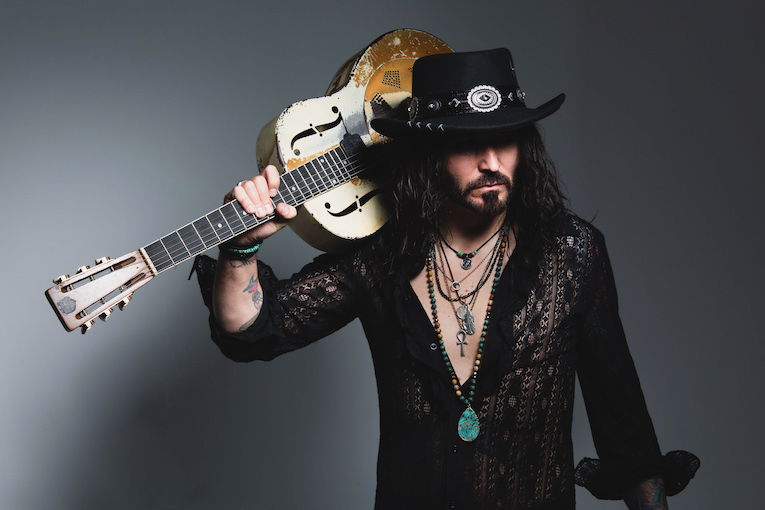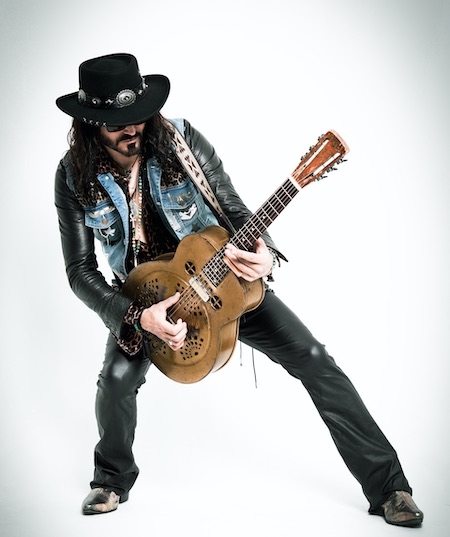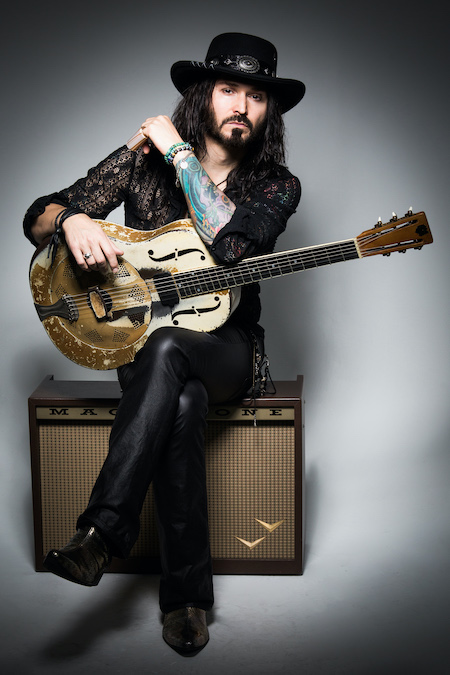
Photo: Troy Redfern by Adam Kennedy
By Ellie Rogers
Hot on the heels of his critically acclaimed 2021 album The Fire Cosmic, British guitarist and songwriter Troy Redfern is poised to unleash The Wings Of Salvation – a 10 track blues-rock tour de force full of rugged resonator riffs, blazing guitar solos and vocals so magnificently gravelly you can’t help but wonder if Troy got his Corn Flakes mixed up with a bag of builders’ grit on the morning of recording.
The album, which will be released via RED7 Records on Friday September 23, was recorded and produced by Dave Marks at Dulcitone Studios, before being mastered by Sean Magee at the legendary Abbey Road Studios in London.
For those familiar with Redfern’s playing, there’s plenty of the kind of incendiary bottleneck graft that has earned him the title of ‘Britain’s King of Slide’ to be found on The Wings Of Salvation. But the record also packs some of the most impressive songwriting, the most spacious arrangements and even the most dazzling slide-free fretwork that Redfern has released to date. It’s an exciting twist in the British bluesman’s already boundlessly creative trajectory.
Speaking from his home studio, we caught up with the man himself to hear all about it…
Rock & Blues Muse: In a nutshell, what can people expect from The Wings Of Salvation?
Troy Redfern: Somebody else asked me if it’s a continuation from The Fire Cosmic, and I think it’s a sort of side turn. The production isn’t as heavy across the board. I wanted very specific things with this album. After doing The Fire Cosmic, I wanted this one to be a lot more open sounding so that there’s a bit more space. The Fire Cosmic was a bit more claustrophobic, loud and full-on with lots of guitar tracks. With this one, we wanted there to be a lot more air in the mix. That was one of the things I said to Dave Marks, the producer. I wanted to have slightly more of a three-dimensional sound, where you can hear back a little bit further.
It was also a different process again in terms of writing. We gave ourselves a time limit, and the album – from scratch – was written and recorded in four weeks. So, it was a crazy schedule.
Hopefully, it just sounds like me because that’s the most important thing. I didn’t want it to sound contrived or like I’m trying to go in a certain direction.
R&BM: This one perhaps feels a little more down to earth and live than The Fire Cosmic…
Troy: Exactly that. I’m glad you’ve said that because myself and Dave, who also played bass on the last album, decided that we wanted it to be recorded in a way that albums used to be recorded, where you’d use one take. Each drum track was a full take, the guitar tracks were full takes. There was no Pro Tools for chopping up sections, no autotune. There were lots of constraints, which made it a lot harder.
So, that was very different, but it was good and – I think – also a risk because a lot of the things you get on the radio these days are super produced. We’ve gone the opposite way. In that sense, it is very live. I was pleased that Dave made us all do it that way. It made us unconsciously up our game because we knew that the take was going to be used.
I’m also sure that writing quickly and recording quickly gave The Wings Of Salvation a more organic feel than the last record.

Photo: Troy Redfern by Adam Kennedy
R&BM: When you talk about recording the way it used to be done, were you inspired by any bands or albums in particular?
Troy: I would say, in Dave’s mind, he was thinking about the way that AC/DC would have a very clean palette. You can hear the rhythm guitar sound, you can hear the drum sound. That kind of space. I mentioned Neil Young, especially for ‘Can’t Let Go’. There’s also things that other people have noticed. I put ‘Come On’ out as a single and people thought that sounded slightly glam. At the time, that was not the intention, but it’s fine that people think that. Things just morph when they’re created quickly. Then when people stand back from that, they make their own judgment.
I think Dave wanted it to not sound too hi-fi. He was aware of not wanting it too shiny and squeaky clean.
R&BM: Tough question coming next… If you had to pinpoint a stand-out moment on the record that you’re most excited about sharing with everyone, what would it be and why?
Troy: I love the mid section in ‘Dark Religion’ because it’s quite unusual and the changes, the chord progression and the melody are not like anything I’ve done before. I really like that. It’s slightly cinematic in the changes. I also like ‘Gasoline’ because I’ve always been fond of – and been drawn towards – odd time signatures, which stems from growing up listening to lots of Frank Zappa. I came up with the guitar riff to ‘Gasoline,’ which is in 7, demoed it and sent it to Dave.
The time signature felt quite jerky, so Dave said: “This is great, but let’s make it so that you can’t tell it’s in 7.” It is still in 7/8 but the listener won’t be thrown around by the time signature. I was really pleased to get that in there. I played it to lots of friends before we sent it out to anyone else and no one mentioned it or noticed it, so that was really cool. It was nice to get that rhythmic interest without it being overtly obvious or annoying. It’s going to be the next single, which is even more strange!
R&BM: One of the other striking moments – for me at least – is the guitar solo on ‘Mercy’ because it’s one where you’re not actually playing with a slide. We’ve all got to know you as ‘Britain’s King of Slide’, but do you ever feel like you have anything to prove when the slide comes off?
Troy: I’ve released lots of stuff on Bandcamp – albums that are kind of tucked away on there. There’s one I put out at the end of 2021 called Thunder Moon, which is full of really abstract music; odd stuff and instrumental music I’d recorded over the years. I really enjoy that. With all of that music, I wasn’t thinking about putting it out, I was just enjoying making music with no genre.
Like I said earlier, I grew up with Frank Zappa being one of my major influences. So I like modal stuff, and using Lydian and Mixolydian modes and stuff like that. I think ‘Mercy’ has got a bit of that in there.
But, you know, it’s hard. Not many people pick up on it. I think when people keep seeing the slide thing, they just think that’s what I do. And, mainly when I do photoshoots, I’ll be holding a National. But, I’ve still got an album that I’d love to do that’s more of an abstract, Hot Rats, Zappa-in-late-’69 kind of thing.
Obviously, it’s not going to be commercial and hardly anyone’s going to listen to it, but the dream album is to do that!
With all the stuff I’m doing, I have a sort of musical multiple personality disorder! At the end of the day, I enjoy all of it.
R&BM: You’re clearly a prolifically creative person. Including the ones “tucked away” on Bandcamp, you’ve released six albums in the last two years. It’s almost unprecedented. Can you put your finger on where the inspiration comes from, or do you just possess a damn hard work ethic?
Troy: I remember when I was 15 or 16 (which is a long time ago), wanting to record. I had a four-track recorder and I just wanted to get ideas out. That’s always been my thing. I’ve never been someone who’s learnt other people’s songs. My main thrust has always been writing. It’s just such a joy to bring ideas out. That’s the thing – when you hear stuff recorded that’s been in your head, or that you’ve made up.
A lot of what I released during lockdown was stuff from my hard drive that was never meant to be released. I was just doing it for myself. Even if I wasn’t doing this now, and I wasn’t going out gigging, I would still be recording stuff just to hear it and just for the joy of making something.

Photo: Troy Redfern by Adam Kennedy
R&BM: On the subject of which, you also made the album artwork for this record and its predecessor The Fire Cosmic. Tell us a little bit about your other side as a visual artist…
Troy: I’ve always loved art. When I left school in ‘91, I wanted to go to art college. At the time, my parents didn’t want me to do that – they wanted me to go out and pay my way. I carried on messing around with stuff and, over the years, I’ve drawn and kept my hand in that world.
It was great to do the cover for The Fire Cosmic because it was a bit of an accident. I had hired someone from Brazil to do it, and then I found Procreate and I started messing around with that. I put the image up online – which I wouldn’t have done if I’d known I was going to release it as an album cover – and the response was ridiculous! So I decided to use it. It was a real sense of achievement because comic art was something I wanted to do when I was 14. Life just took me in a different direction. So it was nice to feel like that aspect had been fulfilled in some way.
Then, with The Wings Of Salvation, I was speaking to Dave about it – we’re both comic book and Star Wars nerds – and he was saying that this album is far more Tatooine than it is Jack Kirby. It’s more organic in the way it was recorded. It was playing on my mind that I had to do this album cover, and I went back to a photo that my daughter took of me years ago. I found some charcoal, some textured paper and some pastels and just sat down and started working on it. The good thing with the charcoals – which I’d never used before – was that they were more textural, organic and real, than the digital thing.
R&BM: So you sing, write, play, paint – I know you’ve produced as well – is there anything you can’t do?
Troy: There’s something I’d like to do and that’s get into sculpting. I’ve got the stuff here ready to go, but it’s just finding the time.
Also, working with Dave and other people at that level, I realised that, having the drive and the organisation to get stuff recorded and performed perfectly, in the stylistic way that someone wants to record, is hard. I couldn’t do that.
R&BM: In all seriousness though, do you think being such an all-rounder has really helped you get to where you are today because you haven’t had to be overly reliant on others?
Yeah. All the other stuff, I did by myself. But, with these last two albums, and working with people who are really good, you have to up your game. That opened my eyes. Again, there’s no way I could have turned around 10 songs in four weeks. I just couldn’t have done that without Dave. He’s so fast. I was trying to keep up with him! I think it would have taken six months to a year to do it all by myself.
R&BM: You’re a big lover of fine vintage axes and amps. What are the stars of your collection right now?
Troy: There’s a 1929 National Triolian. If the house is burning down – after the family – that’d be the thing I’d grab. There’s a 1935 Dobro M32. Those are the two I’ve been going out by myself with, when I’ve been supporting other artists lately. I’ve got a Maton Messiah acoustic that I love. It’s just a gorgeous guitar, and I’ve got a Strat that I really love that my uncle wound the pickups for. There’s some sentimental value with that one. I put the guitar together from parts, customised it, and then the pickups were made by him. That’s a great guitar to play.
R&BM: What does using vintage gear do – not only for your sound – but also for your mindset when you’re writing or performing?
Troy: The National is what I wrote and demoed most of the album acoustically on. It’s not really hard to play, but you’re certainly limited with what you can do with those guitars – especially in open tunings. There’s lots of nice open, suspended chords that you can do in open tunings, but it does limit you, and it pushes you to get stronger verse and chord ideas. They do slow you down. You have to wrestle them a bit. But the Strat is super easy to play, so I have got guitars that are effortless, which is nice as well. With some parts you don’t want to be thinking about wrestling heavy strings.
I’ve played modern Nationals and the vintage ones just sound better. It’s a different company, and I would just always go for a vintage one. The old cones, whether it’s just because they’re worn in, have a different quality. Once they’re set up, they’re like tanks. They play so well and they’re solid. I’m not worried about taking them out with me, and they feel like they’ve got their own history, so I’m sure that seeps in in some way.
R&BM: What tunings do you use?
Troy: I’ve left the Triolian in C Orkney tuning for as long as I’ve had it. That’s my go-to tuning. Whenever I pick that guitar up, ideas just flow out of it. Maybe it’s the tuning. It’s one Chris Whitley used to use and I’m a huge Chris Whitley fan. There’s probably echoes of that Chris Whitley sound if you know that that’s what the tuning is. You might then hear some of that buried in there…
R&BM: Finally, will you be touring to support the record, and if so, where can people find you?
Troy: I’ll be out for the whole of October, supporting a band called Dare throughout the UK. I’ll be out in Europe from November 10th to December 10th, and we’re just in the process of organising a headline tour for May next year, so keep an eye out for that!
The Wings Of Salvation is due for release on Friday 23 September and is available to pre-order now HERE
Troy’s upcoming tour dates can also be found HERE.
Watch “Come On”

Leave A Comment